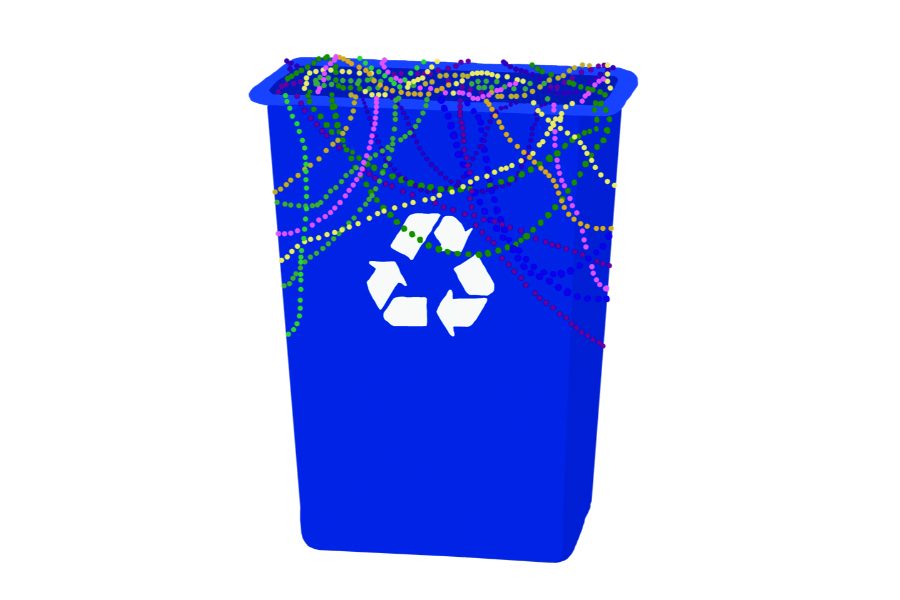New bead recycling program promotes eco-friendly Mardi Gras

New Orleans made national headlines recently when cleaning crews removed 93,000 pounds of Mardi Gras beads from clogged catch basins along St. Charles Avenue. The clogging, caused by the beads and other waste, is thought to have contributed to flooding earlier this year. Though Mardi Gras is an important cultural tradition and economic draw for the city, the carelessness of participants can cause serious environmental consequences. Fortunately, a new recycling initiative shows that the city is committed to reducing waste and protecting the well-being of residents.
The Youth Leadership Council and Arc of Greater New Orleans are implementing a new program which aims to engage parade-goers in keeping the city clean. The organization will hand out recycling bags to people along parade routes, and volunteers will also be working at six recycling stations. As this program is still in development, it will only operate during Krewe of Freret and Thoth in the Uptown area.
Pilot program from @ylcnola and ARC of Greater New Orleans offers Mardi Gras bead recycling along St. Charles parade route | https://t.co/hoCFLFUtZi pic.twitter.com/Agb6TZGfMw
— 89.9 WWNO (@WWNO) February 7, 2018
Clear plastic bags will be used to collect aluminum and plastic items while purple mesh bags will be used for beads and other throws. After the parade, a disposal truck will collect the bags and distribute them to processing centers. The beads that are collected will be sorted as part of Arc’s ongoing bead recycling project which provides programming and opportunities for adults with intellectual disabilities to work with volunteers.
This program is an example of how Mardi Gras can be made more sustainable without sacrificing the elements paradegoers enjoy. By involving the New Orleans community, both locals and visitors have an opportunity to contribute to the well-being of the city by reducing pollution that clogs catch basins and creates unnecessary waste. Recycling beads is especially beneficial, as it supports Arc.
The recycling project may also reduce the burden placed on the city of New Orleans. During each day of Mardi Gras, as many as 600 workers and 87 pieces of equipment are used in cleanup efforts. Though it will still be necessary to clean the street even with the new program, recycling has the potential to reduce the number of items that workers must pick up. It can also reduce the amount the city spends on other maintenance projects, such as cleaning out the catch basins to prevent future flooding.
46 tons of Mardi Gras beads found clogging New Orleans catch basins #PassOnPlastic #Pollution https://t.co/yPbvZ5P4bu pic.twitter.com/cjBdQuqV8P
— Stormsaver Rainwater (@Stormsaver) February 2, 2018
A few weeks of fun should not have to create thousands of dollars of waste and pollution. New Orleans must be conscientious regarding the environmental impacts of all of its events, including Mardi Gras, as the city is especially susceptible to the effects of extreme weather. Recycling beads, cans and bottles may be the first step in shifting the mindset of the city, emphasizing the importance of sustainability.
Despite the great potential this project has, it can only succeed if paradegoers take the initiative to participate by recycling cans, bottles and throws, as well as volunteering to collect these items. Hopefully, revelers will show respect for the New Orleans community and be considerate of the needs of residents.
Hired workers could hand out recycling bags before parades alongside the vendors with their carts full of glow sticks and noisemakers. Walking groups like the 610 Stompers and the Sirens could help hand out bags or collect recyclables as they make their way down the route. City cleanup workers would recognize and know what to do with the purple and clear plastic bags along the route.
The success of Mardi Gras depends upon returning public rights of ways to normalcy and cleanliness as soon as possible after each parade. For this to occur efficiently and effectively, cooperation from the public in following parking restrictions along parade routes and the safe placement of items such as ladders, tarps and furniture on neutral grounds is vital.
This is an opinion article and does not reflect the views of The Tulane Hullabaloo. Madeline is a sophomore at Newcomb-Tulane College. She can be reached at [email protected].
Leave a Comment
Your donation will support the student journalists of Tulane University. Your contribution will allow us to purchase equipment and cover our annual website hosting costs.




Lori • Feb 8, 2018 at 11:45 am
This is a great idea, though with any new endeavor, a key part of it is to get people to actually do it. Our recycling culture in Greater New Orleans is in its infancy, or maybe even still in-utero. I hope this is successful, but I don’t have high hopes that people will use the bags properly.
I once asked my local Parks & Recreation offices why we don’t recycle at the local playgrounds. Every summer I see the trash cans filled up with plastic bottles and cans. I mean, we have curbside recycling, so why can’t the trucks just pass by the playground if the recycling is collected in segregated trash cans? The answer: because the culture is not there.
Signed,
the girl who picks the cans at work out of the trashcan and puts them in the recycle bin sitting right beside it